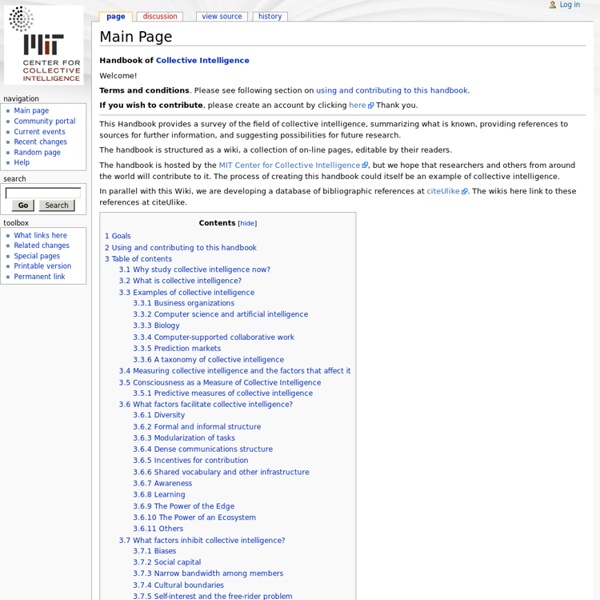



2011 - (Malone et al) The Big Idea: The Age of Hyperspecialization The Idea in Brief As labor becomes more knowledge based and communications technology advances, the division of labor accelerates. The hyperspecialization of workers may be inevitable given the quality, speed, and cost advantages it offers employers—and the power it gives individuals to devote flexible hours to tasks of their choice. This will force managers to master a new set of skills: dividing work into assignable micro tasks; attracting specialized workers to perform them; ensuring acceptable quality; and integrating many pieces into whole solutions. Hyperspecialization also creates new social challenges, such as the possibility of exploitation as work quickly finds the cheapest takers, and the opportunity for deception when workers can’t see the larger purposes to which they are contributing. Adam Smith’s Wealth of Nations, published in 1776, famously described what would be one of the central drivers of economic progress for centuries to come: the division of labor.
The Co-Intelligence Institute Six basic manifestations of co-intelligence If we are going to take wholeness, interconnectedness and co-creativity seriously, we are going to have to face some very challenging implications regarding intelligence: First: Intelligence must involve more than logical reason, since rationality constitutes only a tiny piece of our full capacity to learn from and relate to life. Second: Intelligence must involve more than learning how to control and predict things, since that does not engage the powerful co-creativity of life. Third: Intelligence must be far more than personal, since even ants can together generate an intelligence that's greater than they have individually. Fourth: Intelligence needs to reach far beyond the obvious, since whatever is obvious is connected to things that aren't so obvious, and intelligence should engage with the wholeness and relatedness of things, as much as possible. There is more to intelligence than brains and logic. 1. 2. 3. 4. 5. 6.
2010 - (Malone et al) The Collective Intelligence Genome References (6) 1. T.W. Malone, “The Future of Work” (Boston: Harvard Business School Press, 2004); J. 2. 3. 4. i. ii. Show All References Acknowledgments Funding for this work was provided by the MIT Center for Collective intelligence, including special support for this project by BT Group plc. Collective Intelligence Collective Intelligence = "the capacity of a human community to evolve toward higher order complexity thought, problem-solving and integration through collaboration and innovation" (George Por URL = Towards the creation of a ommicentric Ideosphere: Kosmic Alignment. "We human beings are at our best not when we are engaged in abstract solitary reflection or on our individual transformation for its own sake but when we are engaged together in the act of transforming the world. Tom Attlee of the Co-Intelligence Institute has a restricted definition of collective intelligence, which he considers to be 'only one-fifth of co-intelligence', see George Por summarizes: "There are many definitions of collective intelligence available online. I'll start with definitions proposed by the prolific Pierre Levy": Pierre Levy Jean-Francois Noubel George Por His short version: Others "a. b. c. d. e.
Genome of Collective Intelligence Our current understanding of how organizations can be designed is based primarily on observations of the large hierarchical organizations that rose to prominence in the 20th century. But over the past decade, the rise of the Internet has led to the emergence of surprising new forms of collective intelligence, including Wikipedia, Linux, Google, eBay, and many others. This project involves categorizing and analyzing these new crowd-based ways of organizing work. The project is identifying a set of design patterns (or “genes”) that can be combined and recombined to create systems that harness the intelligence of crowds. Publications Malone, T. Malone, T., Laubacher, R., & Johns, T. Early work on this project included development of an online Handbook of Collective Intelligence, editable, like Wikipedia, by anyone interested. Videos The Future of Work 2.0, Interview with Prof. Very Small Business: Rise of the Micro Job, On-stage interview with Prof. People Principal Investigator Thomas W.